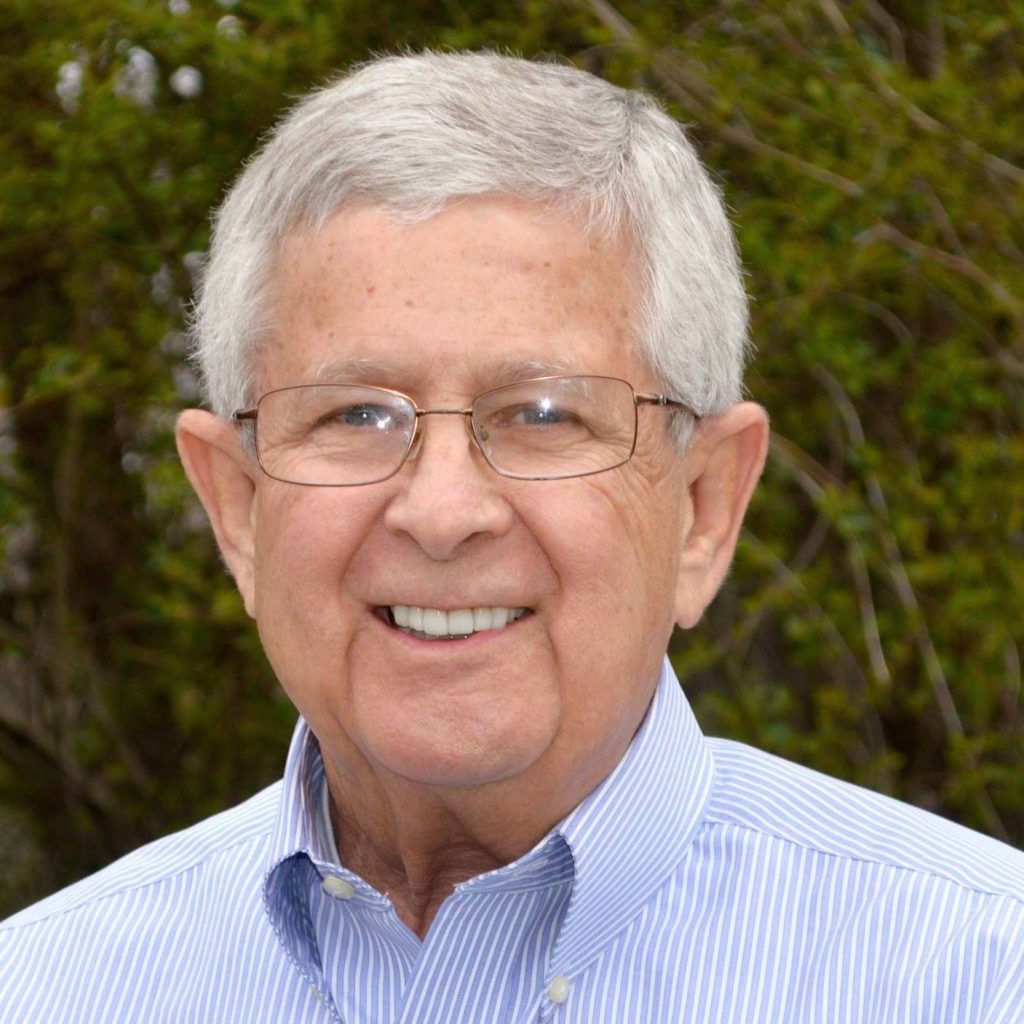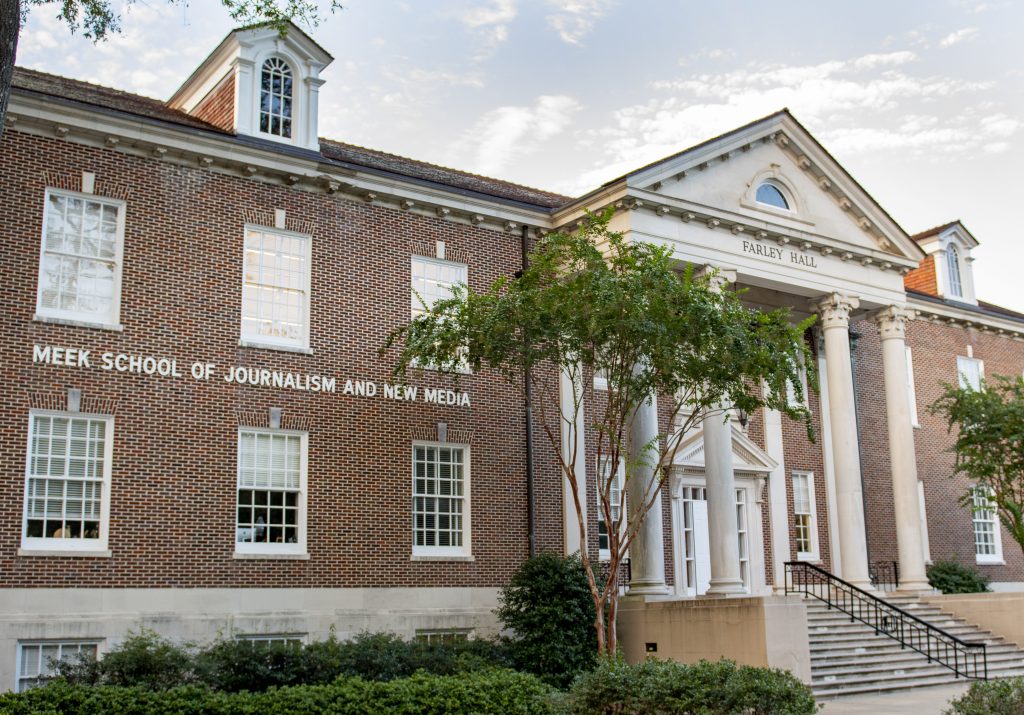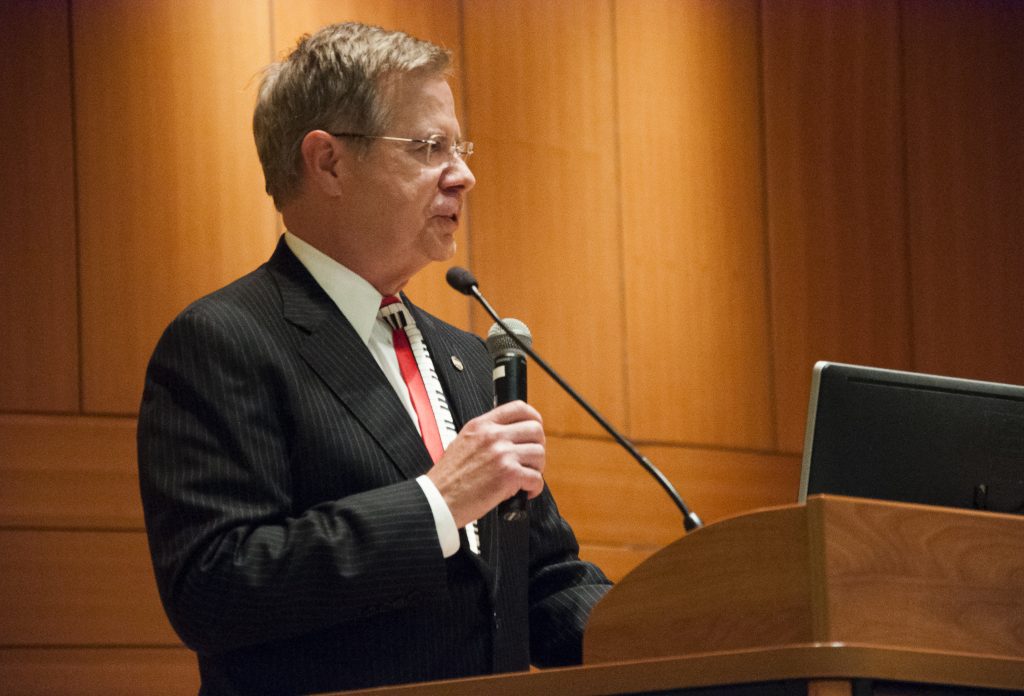Three hours after Ed Meek shared his controversial Facebook post, Meek School of Journalism and New Media Dean Will Norton was on the phone with him. Norton said that that phone call is the only contact any Meek School faculty have had with Meek since the discussion surrounding his offensive comments began one week ago.

Ed Meek. Photo courtesy: Facebook
Since then, Meek School faculty have unanimously voted to call for the removal of Meek’s name from the school, beginning the process of officially cutting ties with the former vice chancellor. Meek responded to that call this past weekend by requesting that the university remove his name from the school. Wednesday morning, Meek declined to comment on the process for removing his name. In an exclusive interview with The Daily Mississippian that same day, Norton said Meek is “grieving” more than anybody else in the aftermath of his since-deleted post.
“I’ve known Dr. Meek for decades,” Norton said. “I’ve never heard him use a racial epithet.”
Norton said Meek’s post did not meet the standards of social media that Meek himself used to teach in his public relations class at Ole Miss. Within four hours of its publishing, Meek’s Facebook post had been shared more than 700 times and had received nearly 600 comments.
“He was so troubled by some of the things that happened on the Square that he just did not follow the kinds of procedures we talk about with our students — that they’re supposed to follow when they send out messages,” Norton said.

Ed Meek, the namesake of the Meek School of Journalism and New Media, has requested his name be removed from the school, following controversy around a now-deleted post on his Facebook page. Photo by Christian Johnson
Norton said the Meek School cabinet, which is made up of him and Assistant Deans Scott Fiene, Jennifer Simmons, Debora Wenger and Patricia Thompson, has turned its focus to making students feel “safe” while the university carries out its process for removing Meek’s name.
“Top priority is the students,” Norton said. “We can’t think about ourselves in this process. We have to think about our students.”
Many journalism classes this past week began with open discussions allowing students to ask questions about the school’s next steps in the name-change process. Fiene said professors have taken it upon themselves to use class time to continue these conversations.
“Faculty are doing it of their own accord. They realize the importance of this,” Fiene said. “They realize that this can’t be something we just ignore. But we — as the cabinet, the administration — we’re not telling our faculty what to do or what not to do.”
Fiene said he can’t remember how many faculty meetings the cabinet has held this past week but that the faculty’s response has been a “collaborative effort.” The Meek School held a faculty meeting at 7:00 a.m. last Friday to draft a statement in response to last week’s listening session, and a final draft of that statement was not published until 7:30 that night.
“I’ve been really pleased with how our faculty has come together and discussed thoughtfully and carefully, but … everyone is leading it, I guess,” Fiene said.
Norton said these meetings have been regular faculty meetings presided over by the dean, and that “at regular faculty meetings, everyone has a chance to talk.” Fiene said the school’s cabinet is working to include all student and faculty discussion in its next steps but that it has not considered how it plans to handle the potential cost of removing Meek’s name.
“This is not about money,” Fiene said. “That, to me, is not a factor in what we’re doing here.”
Simmons said these early morning faculty meetings have been geared toward making sure the school can continue its “business as usual.”
“I think we’re spending a lot more time in meetings to make sure that it’s not having a negative impact on what we’re doing in the classroom,” she said.
Simmons said faculty have focused on continuing to do what they can to prepare students for the “real world” after graduation. She said the journalism school’s response to Meek’s comments has been “appropriate and timely” and that she noticed students supporting the call to remove Meek’s name at last week’s listening session.
“I think students were upset that — or hoping that — the name would come off, but I didn’t get the sense that when they enter the building, they feel unsafe,” Simmons said. “That wasn’t the sentiment that I got.”

Chancellor Jeffrey Vitter addresses the crowd at the open forum. (Photo by: Devna Bose)
Chancellor Vitter announced in a statement Tuesday afternoon that the university had begun an “expedited” process for removing Meek’s name from the journalism school. That process began Tuesday with votes by the Undergraduate and Graduate Councils on whether or not to accept the request for Meek’s name to be removed.
Graduate Council Chair Christy Wyandt said the Graduate Council has approved the request to change the school’s name. As of Wednesday night, the Undergraduate Council could not be reached for comment about the status of its vote.
If the Undergraduate and Graduate Councils vote to accept the name change, the request will be considered by the Council of Academic Administrators. According to Vitter’s statement outlining the process for removing Meek’s name, Associated Student Body President Elam Miller will have a vote on that council.
“I am continuing to push for an increase in student representation in all meetings regarding this, and I am continuing to push for transparency in all decisions,” Miller said.
If the request is approved by all required Ole Miss entities, it will then be presented to the state Institutions of Higher Learning Board of Trustees, which will make the final decision on whether or not to remove Meek’s name from the building.
“The Board of Trustees has the authority to approve or not approve any request or recommendation brought forth by an institutional executive officer,” said Caron Blanton, IHL communications director.
Meek School cabinet members declined to comment on their next steps if the request to remove Meek’s name is denied.
“We’ve got a lot of things to figure out in the coming months,” Fiene said.
Taylor Vance contributed reporting to this story.






